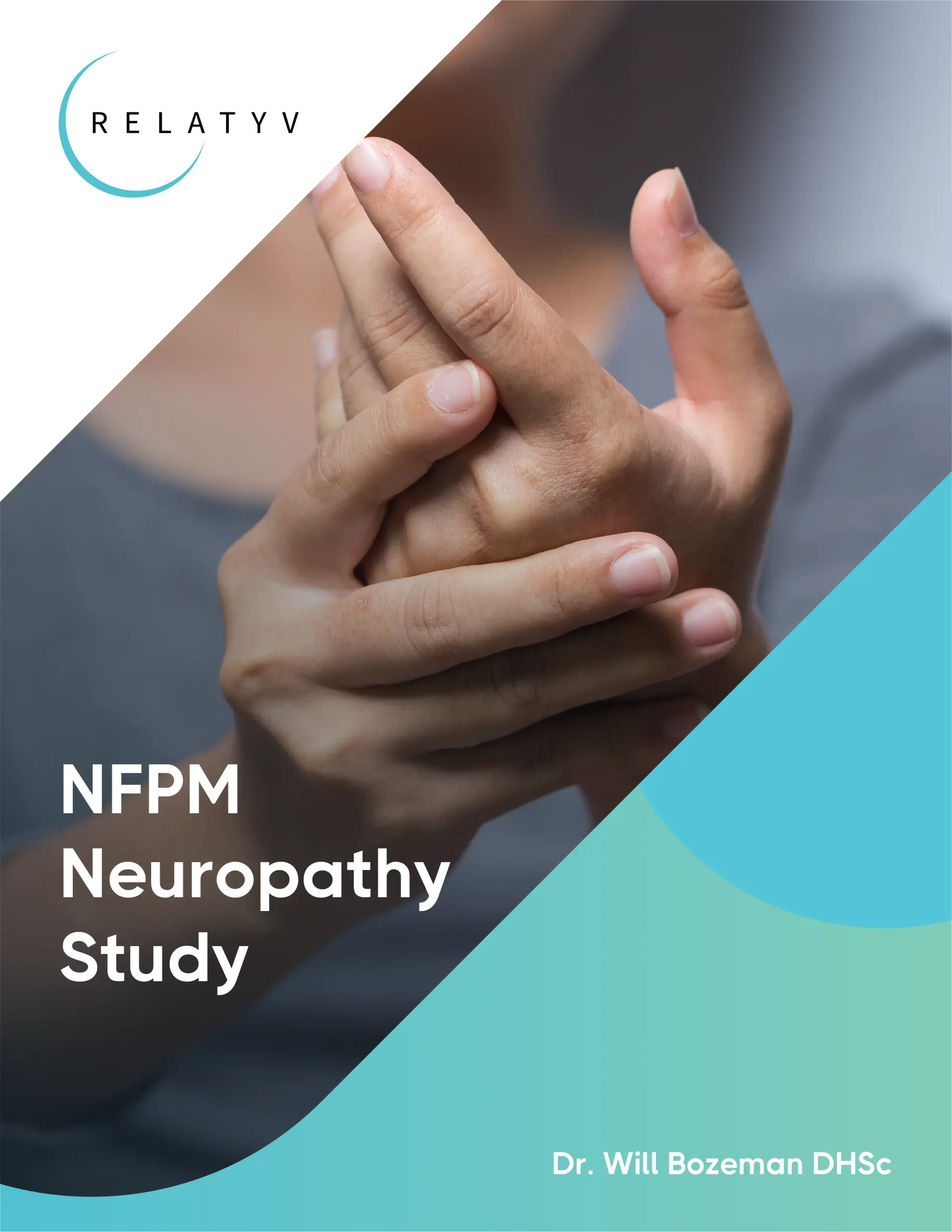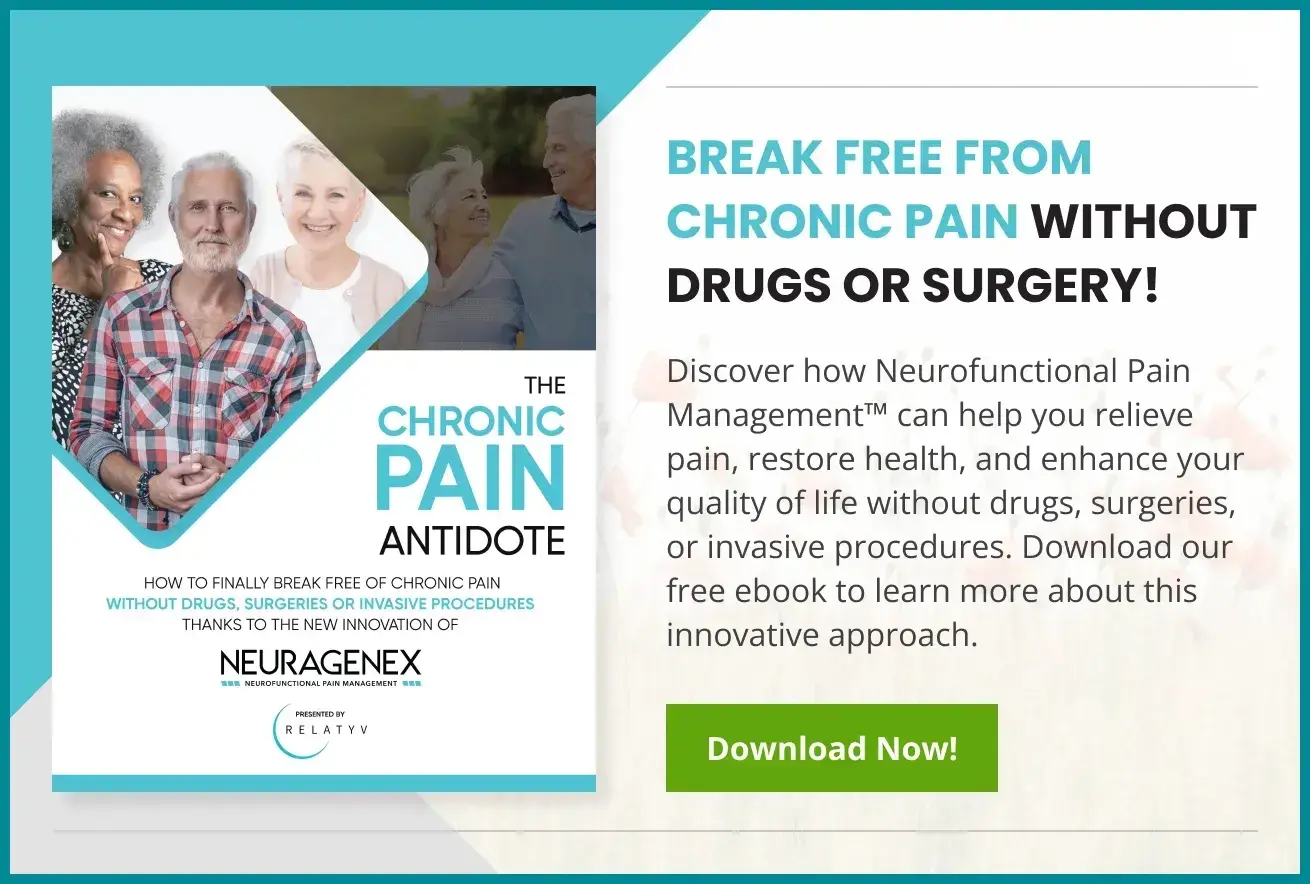Dealing with chronic pain and stiffness in the shoulder can be a very challenging experience, especially when it impedes your day-to-day activities. Although several conditions can cause shoulder pain, one condition that causes stiffness as well as pain is adhesive capsulitis, also known as a “frozen shoulder.”
A frozen shoulder can significantly limit your range of motion and affect your quality of life in several ways. For instance, simple tasks such as brushing your hair, putting on clothes, or reaching for items can become extremely difficult and painful. It can even cause trouble sleeping if you tend to sleep on the affected shoulder. The NFPM treatment protocol can help manage chronic pain caused by a frozen shoulder.
What Is Frozen Shoulder – AKA Adhesive Capsulitis?
A frozen shoulder develops when the connective tissue that surrounds the shoulder joint thickens and becomes inflamed, thereby making it difficult to move the arm. This results in restricted movement and severe pain that worsens over time. There are three stages of a frozen shoulder:
Freezing Stage
At this stage, the shoulder slowly becomes more painful and stiff, making it difficult to move. This stage can last for six weeks to nine months.
Frozen Stage
At the frozen stage, the pain may decrease, but the stiffness remains. The shoulder becomes very difficult to move, and daily activities become challenging. This stage can last for four to six months.
Thawing Stage
The shoulder slowly regains mobility at this stage, and the pain gradually subsides. This stage can last for six months to two years.
Common Symptoms Of Adhesive Capsulitis
The primary symptom is pain in the shoulder joint that can radiate down to the arm and even up to the neck. However, there are other symptoms that people with frozen shoulder may experience.
- Persistent shoulder pain and inflammation at night: Experiencing pain and inflammation at night commonly manifests in the freezing and frozen stages. This is because the body’s natural healing process is at its peak during sleep, causing increased blood flow to the affected area and resulting in pain.
- Stiffness and limited range of motion in the shoulders: As adhesive capsulitis progresses, the shoulder joint becomes increasingly stiff due to the thickening of the connective tissue. This makes it very difficult to perform daily activities like reaching for objects or lifting your arms above your head. Such stiffness and limited range of motion tend to develop during the freezing and frozen periods.
Bicep Muscle Spasm
If you’ve ever experienced painful muscle contractions in your biceps, you know how disruptive spasms can be. They can compromise your sports performance, make certain movements undesirable, and even get in the way of a good night’s sleep....
Joint Pain And Swelling
Joint pain is arguably one of the most common musculoskeletal complaints among adults of all ages. But the fact that this condition is so widespread does not mean that it isn't life-limiting, or that it should be overlooked. Joint pain and swelling can cause...
Joint Stiffness And Swelling
Suppose you are experiencing persistent pain throughout your joints that limits your mobility. In that case, you may be encountering joint stiffness and swelling. These challenges can significantly impact your ability to carry out daily life and enjoy the...
Muscle Spasm In Neck
Muscle spasms that occur in the neck can range from mildly irritating to painful and disruptive to day-to-day life. Not only can they be uncomfortable, but they are often the result of underlying conditions that can cause other symptoms as well. Along with...
Shoulder Muscle Spasm
Did you know that the shoulder is the most flexible joint of the human body? It is crazy to think that one of our most utilized joints is also one of the most complex and unstable, making it highly susceptible to injury and discomfort. Shoulder muscle spasms...
Shoulder Inflammation And Pain
Shoulder inflammation and pain can be a common source of discomfort for many individuals. The shoulder is a complex joint. It allows for a wide range of motion, which, unfortunately, also makes it susceptible to injury and inflammation. Such shoulder pain and...
Risk Factors And Causes Of Adhesive Capsulitis
Although the exact cause of a frozen shoulder is not always clear, research shows that it can be caused by various factors. Some common risk factors include:
Long Period Of Immobilization
Prolonged immobilization of the shoulder joint can lead to adhesive capsulitis. For instance, if your arm is in a sling for an extended period due to a fracture or surgery, it can increase your risk of developing a frozen shoulder.
Age And Sex
Frozen shoulders are more common in people aged 40 and above, with women at a higher risk than men. This is likely because hormonal changes can affect the connective tissue, making it more prone to inflammation. However, it can occur at any age and to a person of any gender.
Existing Medical Conditions
There are a few medical conditions that can increase your risk of developing a frozen shoulder. Many of these conditions lead to a frozen shoulder due to inflammation or lack of use of the shoulder joint. These include:
- Previous shoulder injury or surgery: Scar tissue or damage to the shoulder joint can lead to inflammation and stiffness, causing a frozen shoulder.
- Breast or lung cancer: People with these types of cancers are at a higher risk of developing a frozen shoulder because of inflammation in the chest area.
- Bursitis or rotator cuff tendinitis: These conditions can cause inflammation and stiffness in the shoulder joint as a result of overuse or injury.
- Stroke: People who have had a stroke can develop a frozen shoulder during recovery due to limited movement and lack of use of the affected arm.
- Diabetes: People with diabetes are more likely to develop a frozen shoulder due to increased levels of glucose, which can damage the connective tissue.
- Neurological disorders: Conditions such as Parkinson’s disease can increase the risk of a frozen shoulder due to reduced mobility and muscle weakness.
- Thyroid disorders: Imbalances in thyroid hormones can cause inflammation and stiffness in the shoulder joint, due to interference with the body’s natural healing process.
- Rheumatoid arthritis: Rheumatoid arthritis is an autoimmune disorder that causes inflammation in the joints, including the shoulder joint, leading to a frozen shoulder.
Diagnosis And Evaluation Of The Condition
If you’re experiencing shoulder pain and have mobility issues, it’s essential to seek medical attention. A doctor will typically do the following to diagnose a frozen shoulder:
- Medical history discussion: The doctor will ask you about any injuries or health conditions that may have caused the pain. They may also ask about your daily activities and any medications you may be taking. This information can help in determining the root cause of the shoulder pain.
- Physical examination to assess range of motion and pain: Your doctor will evaluate your shoulder joint’s range of motion. They will do this by asking you to perform simple movements involving the shoulder joint. They may also apply pressure to various areas around the shoulder to determine the source of your pain and stiffness.
- Imaging tests such as X-rays or MRI to rule out other conditions: Your doctor may order imaging tests to rule out other conditions like fractures or tears in the shoulder joint. These imaging tests will also help determine the extent of inflammation and thickening of the connective tissue.
Conventional Treatment Options
Once you’ve been diagnosed with a frozen shoulder, there are several conventional treatment options that most traditional medical professionals will recommend. They include:
- Over-the-counter pain relievers or prescribed medications: Your doctor may prescribe pain medications or anti-inflammatory drugs to alleviate your pain and reduce inflammation in your shoulder joint. However, many such medications have side effects, especially if taken for an extended period. Additionally, these medications rarely address the root cause of the problem.
- Physical therapy: A physical therapist will prescribe exercises that help stretch and strengthen the shoulder muscles, increasing mobility and reducing stiffness. They may also use manual techniques to improve your range of motion.
- Corticosteroid injections: These injections aim to help reduce pain and inflammation in your shoulder joint. However, they may not offer long-term relief and can also cause side effects.
- Hydrodilation: This procedure involves injecting sterile fluid into the shoulder joint under pressure, which helps stretch and expand the connective tissue. It can provide temporary relief but may require multiple sessions.
- Surgery: In severe cases, surgery may be recommended to loosen the tight connective tissue in the shoulder joint. However, this is a highly invasive option and should only be considered as a last resort. Surgery can result in various complications, including infection and nerve damage.
The Neuragenex NFPM Protocol For Pain Induced By Adhesive Capsulitis
We take a Neurofunctional Pain Management (NFPM) approach to treating chronic pain and inflammation caused by conditions such as a frozen shoulder. This whole-person protocol involves addressing the neurological factors that are contributing to the root cause of the symptoms you’re experiencing.
Our treatment modalities are all FDA-cleared and have been shown to be both safe and effective. We do not use any medications, nor do we recommend invasive procedures (such as surgery) or unproven and risky alternative therapies, such as chiropractic treatment. This protocol involves the use of the following to help manage chronic pain and inflammation:
Electroanalgesia
Electroanalgesia is a pain management technique that uses high-pulse electrical current to ease pain, boost blood circulation, improve mobility, and induce...
IV Therapy
IV nutritional therapy, or intravenous therapy, involves administering vital nutrients directly to the bloodstream through an IV. This type of treatment bypasses the digestive system, allowing for maximum absorption and utilization of nutrients by the...
Lifestyle Counseling
Lifestyle counseling is an approach to managing chronic pain that involves identifying, assessing, and modifying lifestyle factors contributing to an individual's pain. For example, lifestyle factors such as nutrition, physical activity, stress, sleep quality...
Elevate Your Shoulder Health With Neurofunctional Pain Management
A frozen shoulder is a common condition that can greatly impact a person’s daily life. While conventional treatment options may provide temporary relief, they often come with side effects and rarely address the root cause of the problem.
We offer a whole-person approach to managing chronic pain and inflammation caused by conditions like a frozen shoulder. The NFPM protocol involves FDA-cleared modalities such as IV nutritional therapy, electroanalgesia, and lifestyle counseling to help improve overall shoulder health and function. By addressing neurological factors and promoting whole-person wellness, we strive to provide safe and effective long-term pain relief for our patients.
Ready to step towards pain-free shoulders? Start your journey now!




